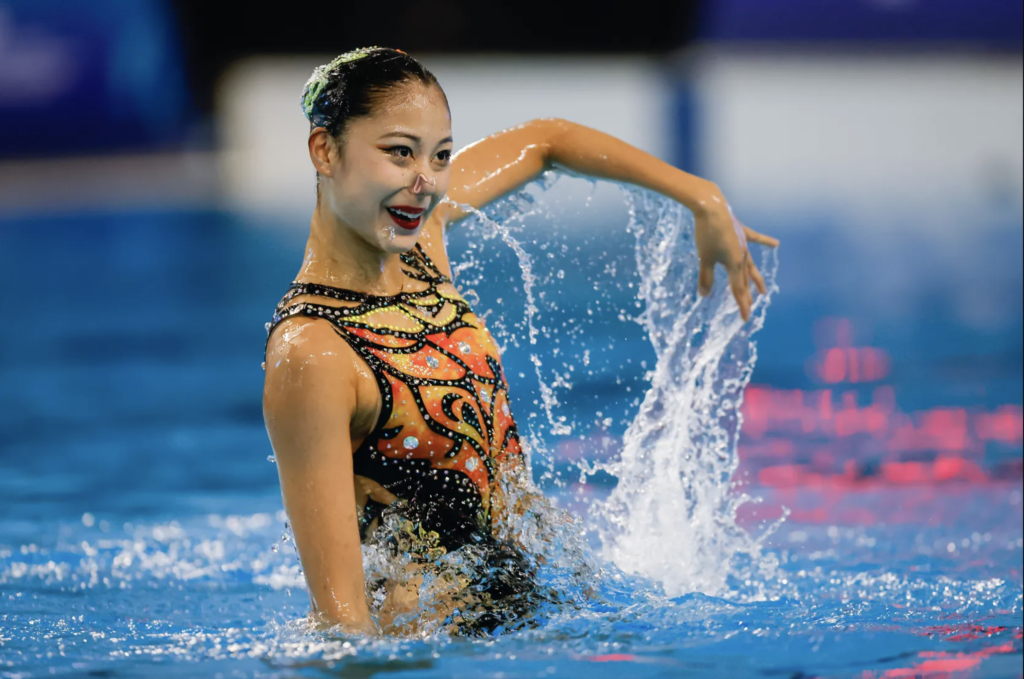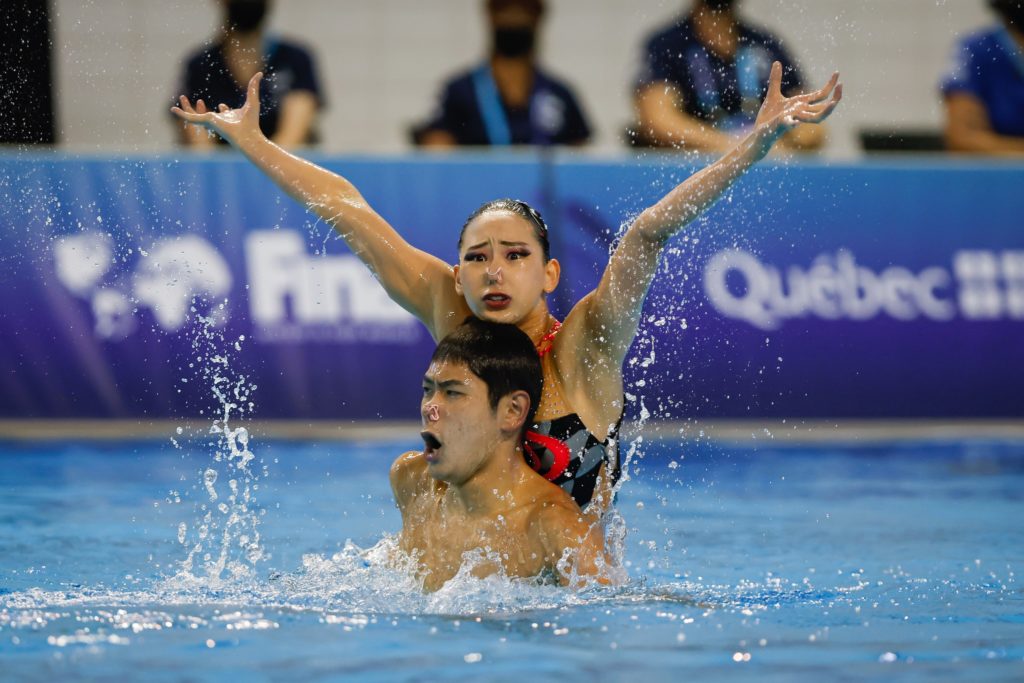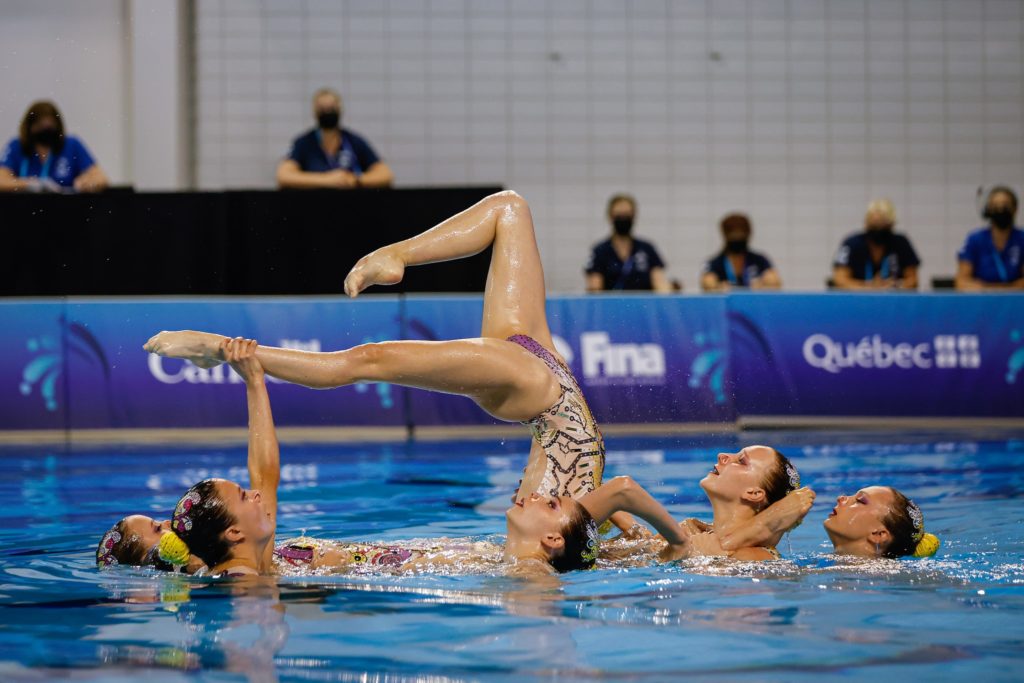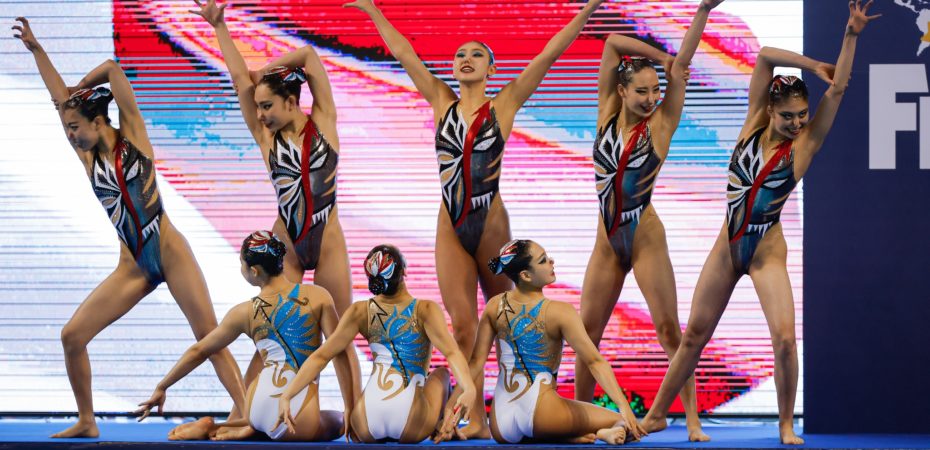After four years and the cancellation of the 2020 event, the FINA World Junior Championships were finally back on track. Quebec City, Canada, hosted the 17th edition, where 26 countries participated, vying for 12 gold medals. Indeed, like in the World Youth Championships held two weeks prior, the men’s solo events were included on the programme for the first time.
As in every other major international meet this year, Russia and Belarus were banned from competing. Moreover, Ukraine’s Daria Moshynska and Anastasiia Shmonina, the reigning European junior champions in solo and duet, did not participate. Both were also part of the Ukrainian senior team this season. Finally, China and Israel were amongst the notable absentees in Quebec in all events. The latter had sent a full team to the European Junior Championships in Alicante, although a few athletes were also members of the senior squad.
Japan ultimately won eight of the possible golds in Quebec, while Spain earned the remaining four, including both in the men’s solo events. The European nation was never far behind in the events it didn’t win, finishing second and right behind the Japanese in seven events.

Soloist Higa Moe was sensational for Japan, comfortably winning both World titles in solo. She showed incredible control, technique, and difficulty in her technical solo, set to the theme of “Suspense.” She received 88.4438 for the gold, more than three points ahead of the silver medalist. Her “Strange Story” free routine, which she had already unveiled at the World Youth Championships, scored 89.7667.
Overall, Higa has had an exceptional yet very busy season. Indeed, she competed in all three World Championships and medaled in each of them. The 14-year-old (!) made her international debut at the senior World Championships in Budapest in June. There, she swam in technical duet, technical team, free team and free combination. She won two silvers and one bronze in the team events.
A few weeks later, she traveled to the U.S. and swiftly became the World Youth Champion in solo and figures. She ended her incredible season in Canada by adding two more World titles to her resume, this time in the junior category.
With Higa’s victories in both the youth and junior age groups, Japan has thus won every women’s solo World title this year.
Hotta Yukina and Fujii Moka won both duet titles, scoring 87.5591 in tech and 88.7333 in free for their “White Tiger” routine. Like Higa, Fujii was also part of the bronze medal-winning team routines at the senior World Championships.
Sato Yotaro, the two-time senior World silver medalist and one of the breakout stars of the season, was this time paired with Shimada Ayano in the mixed duet. Swimming the same choreographies as in the senior category — “Tarzan” in tech and “Samurai” in free — the two brought home two more World titles with scores of 84.0251 and 85.7000, respectively.
Finally, Japan won the technical team by swimming to Woodkid’s “Run Boy Run” and scoring 88.3786. The nation’s “Haunted House” free combination routine scored 89.1667 for yet another gold. Sato did take part in it as it’s finally a mixed event in all FINA competitions.
This Japanese team was coached here by Miya Tachibana (now Miyakawa) and Miho Takeda (now Suzuki). Tachibana and Takeda are the last duet to have beaten Russia at the World Championships, back in 2001. Both are five-time Olympic medalists and competed in three Olympics (1996, 2000, 2004). They won silver in duet together in 2000 and 2004.

The Japanese won silver in the remaining events. In the free team, they swam to the theme of “Angels and Demons,” but narrowly missed the gold with a 89.2333. Finally, Sato performed in the inaugural men’s solos. His “Snake” technical routine earned him 80.9088, while his “Alien” free routine scored 83.3000, only 0.3000 points behind the gold medalist.
Ultimately, Japan was the only nation to medal in every single event it entered in, 11 in total.
Spain’s Dennis Gonzalez, already a seven-time European junior champion, made history yet again by becoming the first World junior champion in the men’s solos. His first title came in the technical event, where he swam to “Mind Heist” by Zack Hemsey. He received 82.6639, nearly two points ahead of Sato. It was a lot closer in free, but his 83.6000 for his routine set to “I Feel Like I’m Drowning” by Two Feet clinched the title.
Gonzalez also swam in the mixed duets, free combination and highlight routines. He added yet another gold to his medal collection in the latter, performing the “Queen” choreography to score 87.5333. He won three silver medals in the remaining events.
In the technical mixed duet, he and Valeria Parra scored 83.2318, a 2.8000 points increase since the European Junior Championships. In the free event, he was paired with Maria Bofill, and swam to a compilation of music from the Kung Fu Panda movie for a score of 84.6333.
Gonzalez ends this junior season with six European junior medals — all golds — and six World junior medals including three golds. Undoubtedly, he is one to watch in the future.
Spain’s final gold and World title came in the free team final, the last event of the competition. The Spaniards were trailing behind Japan after the preliminaries by only 0.1667, so the world title was certainly within reach.
Swimming last in the final, they had a near-flawless performance with their choreography to the theme of “Witches,” created by coach and Olympic medalist Paula Klamburg. They won the event with 89.3000 and by a very slim margin of 0.0667 points. The athletes burst with joy upon realizing they had moved up one spot from the preliminaries, thus becoming World junior champions in this Olympic event.
Aitana Crespo and Mercedes Diaz, silver medalists at the European Junior Championships, earned two more silvers in the duet events here. Soloist Marina Garcia brought back another silver to the country in the free solo, right behind Higa. Garcia was undeniably quite pleased with this ranking as she had finished behind Italy’s Susanna Pedotti in Alicante. Unfortunately, she did miss the podium in the technical solo due to shaky elements, and had to settle for fourth place.
Like Spain, Italy was the only other nation entered across all 12 events. It was a very successful campaign for the Italians, who had just performed as pre-swimmers at the European Championships in Rome.
Susanna Pedotti, a last-year junior athlete, is definitely one to watch as she hopefully makes her way onto the senior squad. Pedotti medaled in every event she was entered in, including both solos, free duet, and all four team events. In the end, she left Quebec with two silver and five bronze medals.
The final medal for the nation came in the technical mixed duet, where Alessia Austranti and Filippo Pelati won bronze with 79.5817, edging out Kazakhstan by only 0.1563. They swam the “Robots” choreography that Italy’s senior mixed pair first showed off at the 2015 FINA World Championships. Pelati was the youngest of the field. He only turns 15 this year, and thus has three more years in this age group.
Kazakhstan’s Eduard Kim, the 2019 World Youth Champion in mixed duet, continued to make history for his country by earning bronze in both men’s solos and in the free mixed duet. Kim had already performed in the technical solo at the World Series Super Final. At the time, he actually had finished right behind Kenneth Gaudet from the U.S.
With his “A Story About Love” routine, Kim this time moved ahead with a final score of 79.2620. It was however a close battle for the bronze between him, Mexico’s Diego Villalobos and Gaudet, all separated by 0.8995 points.
In the free solo, it was again a close finish between Kim and Villalobos for the bronze. Once more, the Kazakh pulled ahead with his “Wizard” routine and scored 79.6000. Villalobos, silver medalist in mixed duet at the 2021 Junior Pan American Games, swam to “Take Me to Church” by Hozier and finished very close behind with 79.5333.
Of note, Mexico was the only nation this season to have three different men compete in all three World Championships. It’s a very exciting and encouraging feat, especially since the country had never entered in a mixed duet event internationally until December 2021.
Overall, 10 nations participated in the mixed duets. Most notably, eight men performed in the inaugural men’s solos: Murillo Da Cunha (BRA), Dennis Gonzalez (ESP), Ranjuo Tomblin (GBR), Filippo Pelati (ITA), Sato Yotaro (JPN), Eduard Kim (KAZ), Diego Villalobos (MEX), and Kenneth Gaudet (USA).
Additionally, men were finally allowed to swim in the free combination and highlight events for the first time in a FINA competition.
Spain, Japan, Mexico and Kazakhstan all took up the opportunity. As a result, Dennis Gonzalez, Sato Yotaro, Diego Villalobos, Eduard Kim and Artur Maidanov all swam in one or both events for the first time on the world stage. Most notably, Kazakhstan even had two men (Kim and Maidanov) perform in its “Spanish Dance” free combination routine.
France won two bronzes in the technical solo and technical duet, the first medals for the country at this competition in over two decades. Orianne Jaillardon actually opened the entire meet, swimming first in the technical solo final, which was the very first event on the first day.
She handled it beautifully and scored 84.3904 to make it up to the podium. She had just finished sixth in that event, albeit with harder elements, at the European Championships. Earlier this summer, she also performed at the World Championships.
In the technical duet, she and Romane Lunel scored 84.6559 and upset Italy, which had been ahead In Alicante, for the bronze medal. Both had just arrived from Rome, fresh off winning a historical bronze medal in the technical team. Lunel also earned another one in highlight.
Greece won the bronze medal in the highlight event here with its “Unstoppable Spirit” choreography, and a 84.7333. It’s been an incredibly busy season for most of the Greek athletes. Indeed, six of them competed in every junior and senior international meet this yearsteen. Moreover, coaches Anastasia Goutseva and Barbara Lithadioti have essentially been on the road since mid-June. The two lead both the senior and junior squads and have thus attended all four World and European Championships. Lithadioti also coached the youth team at the European Youth Championships.
All this competitive experience has however paid off in Quebec. The Greeks also had one of their best swims of the season with their “Icarus” free team, which received 85.2000.
A few other athletes had just essentially come straight from competing at the European Championships, like Marloes Steenbeek (Netherlands), Klara Bleyer and Susanna Rovner (Germany), Robyn Swatman (Great Britain), Pinja Kekki (Finland), or Noemi Buchel and Nadina Klauser (Liechtenstein), amongst others.
Steenbeek was probably amongst the busiest athletes this season, as she is also part of the senior duet for the Netherlands alongside Olympian Bregje de Brouwer. She is the only swimmer to have competed in every senior and junior international meets this year, including all four FINA World Series legs.

It was great to see Canada in the junior category once again after not participating in the 2021 Junior Pan American Games. While they performed the Olympic routines in both duets and in the technical team, the Canadians did unveil a new free team choreography. The interesting, gentle yet powerful routine was created by Karine Doré. Set to the theme of “That’s Us Standing,” it scored 83.6667 in the final.
Slovakia’s team continued to steadily improve, most notably increasing its score by nearly 2.2 points since the senior World Championships with their “Valkyries” free team, swam by the same athletes. The nation did not participate in either junior or senior European Championships this season as a team.
Unfortunately, a few nations couldn’t finish their competition as planned. The U.S. squad had to withdraw from the free team event after being hit by both Covid-19 and injuries.
In the highlight event, Australia did start to swim but one of the athletes suffered a knee injury during the routine and could not continue. The music was stopped by the meet referee, and the country thus did not receive a score.
Although still able to compete, Chile suffered a setback after Antonia Mella injured her foot and could no swim. She was their soloist and team flier. The country did however notably moved up two spots, from 12th to 10th, between the free team preliminaries and the final.
All replays are available on FINA’s YouTube channel.
ARTICLE BY CHRISTINA MARMET
Cover photo by Antoine Saito
If you’ve enjoyed our coverage, please consider donating to Inside Synchro! Any amount helps us run the site and travel costs to cover meets during the season.

